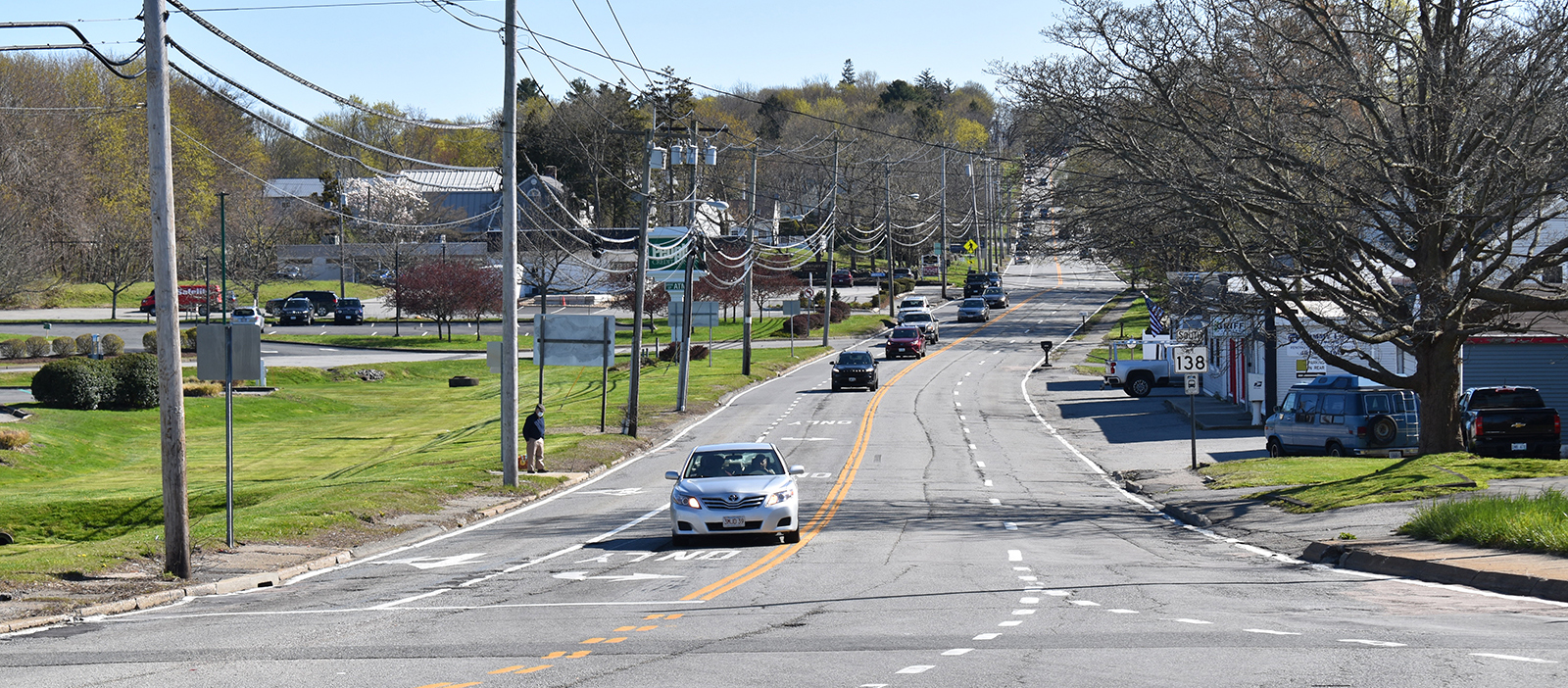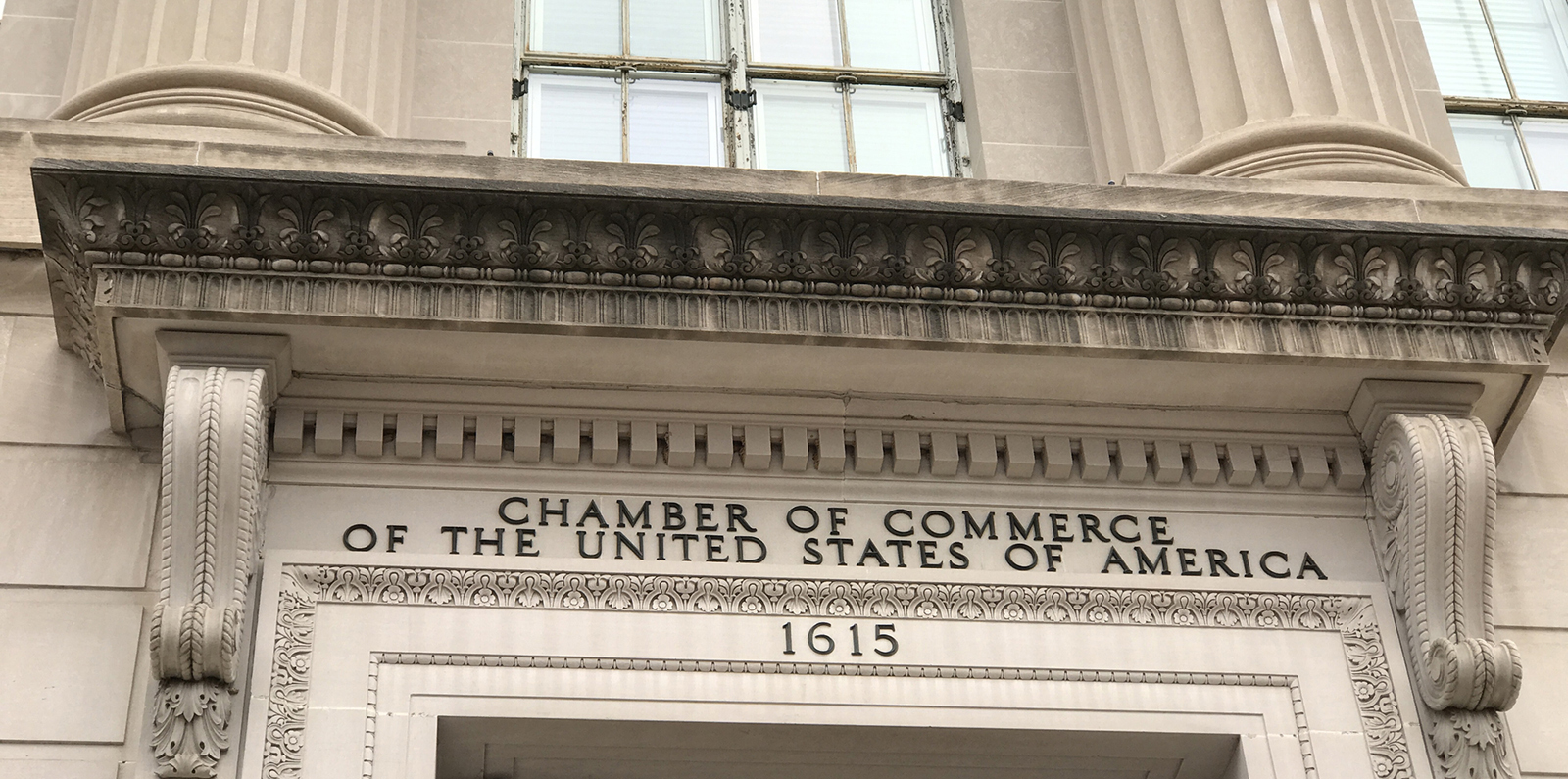Fossil Fuel Guard Dog is Top Dog Climate Menace
April 17, 2024
While much of the world, well, at least some of it, works to mitigate the impacts of the climate crisis, the planet’s largest business organization continues to stand in the way.
The U.S. Chamber of Commerce’s most recent obstructionist effort is lobbying to incapacitate a new climate risk disclosure rule approved last month by the Securities and Exchange Commission (SEC).
The recently adopted rules “enhance and standardize climate-related disclosures by public companies and in public offerings,” according to the SEC. “The final rules reflect the Commission’s efforts to respond to investors’ demand for more consistent, comparable, and reliable information about the financial effects of climate-related risks.”
The rules, among other things, would require a registrant to disclose climate-related risks that have had or are reasonably likely to have an impact on business strategy or financial condition; activities, if any, to mitigate a climate-related risk; and any oversight by the board of directors of climate-related risks and any role by management in assessing and managing climate-related risks.
The Chamber, however, wants us to ignore the climate crisis, and if its demands to further weaken SEC rules aren’t met, it has threatened legal action. Essentially, the Chamber wants the economy to remain anchored to polluting fuels, so it blocks investment and action designed to create cleaner ways to power our future. It doesn’t care that the climate crisis is inflicting rising costs on the U.S. economy and mounting dangers on humankind.
“While it appears that some of the most onerous provisions of the initial proposed rule have been removed, this remains a novel and complicated rule that will likely have significant impact on businesses and their investors,” the Chamber noted in a March 6 press release. “The Chamber will continue to use all the tools at our disposal, including litigation if necessary, to prevent government overreach and preserve a competitive capital market system.”
It’s the same tired rhetoric this fossil fuel front group has been belching for years.
Sen. Sheldon Whitehouse, D-R.I., has long been exposing the extent of the Chamber’s efforts to kill, repeatedly, climate change legislation. He shared his thoughts on the Chamber’s latest attempt to block progress in a recent press release.
“Climate change poses severe economic and business risks. … Emissions reporting is the best way to measure a company’s transition risks and, like any other indicator of a company’s long-term health, it is material information for investors to consider,” he said. “While better than no rule at all, it is unfortunate that the SEC and other regulators continue to shy away from finalizing robust rules that would better protect investors, the economy, and the planet.”
He noted the Chamber lobbied the SEC hard to water down the new rule.
“The Chamber continues to be a menace to climate safety, and any company that considers itself a responsible actor on climate should take a serious look at whether its trade associations are fueling climate and economic catastrophe,” Whitehouse said.
In an opinion piece headlined “Corporate America needs to level with investors on climate change” recently published in USA Today, economist Joseph Stiglitz and Peter R. Fisher, a former senior official at the U.S. Treasury and the Federal Reserve, noted 90% of the companies in the S&P 500 issue sustainability reports. But they are largely just for show.
“A third of the assets under management in the United States are now said to be ‘sustainable’ investments,” they wrote. “But in the absence of minimum corporate disclosure standards, investors face the risk of being unable to recognize corporate ‘greenwashing’ hyperbole with the result that market prices will be unable to reflect investors’ views on the costs and benefits of reducing carbon — and our markets will fail to allocate capital efficiently.”
It has been six decades since scientists first expressed concern to a U.S. president about the dangers of a warming climate. The Fifth National Climate Assessment — compiled by 750 experts and released in November — is crystal clear: the planet is warming faster than at any time in human history, and the burning of fossil fuels is largely responsible.
The climate crisis is making it harder to “maintain safe homes and healthy families” in the United States, according to the assessment. Extreme weather and other harmful impacts of the climate emergency U.S. residents are already experiencing — heat waves, wildfires, extreme rainfall — will worsen as temperatures continue to rise. March marked the 10th straight month to be the hottest on record, with both air temperatures and the world’s oceans hitting an all-time high for the month.
Despite overwhelming scientific consensus — and volumes of internal research by fossil fuel corporations that support this consensus — industry enablers, such as the Chamber, continue to deride any mitigation effort that attempts to reduce the amount of fossil fuels we burn. They plow ahead with shifting campaigns of misinformation.
Scientific misinformation (lying) undermines public understanding of an issue — whether about the climate crisis or vaccines — erodes public trust, hides the truth, and stalls evidenced-based policymaking. The status quo and its financial interests are protected.
Much of the distracting climate misinformation noise is manufactured and supported by the Chamber. The country’s largest lobbying group has long been running interference for ExxonMobil, Shell, Chevron, and the other fossil fuel giants.
Chevon’s vice president and general manager of government affairs, ConocoPhillips’ senior vice president of government affairs, Phillips 66’s executive vice president of government affairs and general counsel, and Shell USA Inc.’s president all serve on the Chamber’s board of directors.
A 2021 report by Brown University’s Climate and Development Lab found that the Chamber, during what the report called the “formative period” for U.S. climate policy from 1989-2009, consistently characterized climate science as needing more time to develop and claimed the solutions being proposed to reduce carbon emissions “would be harmful to the American economy and put us at disadvantage to other countries.”
The report noted the Chamber “has long been a powerful force obstructing climate action and an active funder, leader and participant of many countermovement groups.” It also noted the organization’s boardrooms and committees have long been staffed by fossil fuel executives.
In 2009, for example, the Chamber submitted written comment to the Environmental Protection Agency after the federal agency said carbon dioxide is a hazard to human health. The 86-page document is packed with juvenile claims that attempt to cast doubt on the fact we are releasing dangerous amounts of CO2 into the atmosphere. One ridiculous excerpt:
“The Administrator has thus ignored analyses that show that a warming of even 3 [degrees] C in the next 100 years would, on balance, be beneficial to humans because the reduction of wintertime mortality/morbidity would be several times larger than the increase in summertime heat stress-related mortality/morbidity.”
The Chamber’s rubbish rebuttal ends with there are “profound and wide-ranging scientific uncertainties” about climate change and its impacts that are “vehemently controverted among scientists and technicians of numerous stripes.”
One of the world’s top scientific agencies doesn’t agree. “The vast majority of actively publishing climate scientists — 97 percent — agree that humans are causing global warming and climate change. Most of the leading science organizations around the world have issued public statements expressing this,” according to National Aeronautics and Space Administration.
The Chamber also submitted a supporting document that included even more immature statements about climate change:
“Humans have become less susceptible to the effects of heat due to a combination of adaptations, particularly air conditioning. The availability of air conditioning is expected to continue to increase.”
“Overall, there is strong evidence that populations can acclimatize to warmer climates via a range of behavioral, physiological, and technological adaptations.
“The scientific evidence is clear that cold is a more potent hazard than heat.”
Non-ribbon-winning, junior-high-science-fair stuff presented as Sherlock Holmes-like brilliance.
The Chamber sued the EPA for its 2009 ruling, seeking to overturn its finding that greenhouse gas emissions endanger public health and welfare.
Two years later the free-market apologist was back at it, urging Congress to focus on expanding fossil fuel energy production and not on “high-cost energy sources” such as wind and solar.
Apparently, the Chamber doesn’t consider the renewable energy sector part of the U.S. economy. (Not one of the Chamber’s 84 members has a substantial connection to renewable energy, but nuclear power is represented.)
The Chamber has opposed bipartisan cap-and trade-legislation. It led a coalition of trade groups suing to block an EPA plan to reduce carbon emissions in the electric power sector. It funded a study critical of the Paris Agreement. It spearheaded a lobbying campaign in support of a Congressional Review Act resolution to repeal a Department of Interior rule limiting methane emissions from oil and gas facilities on public lands.
While the Chamber’s climate change rhetoric has softened in the years since, its decisions are still dominated by fossil fuel interests.
The Chamber represents a diverse group of businesses, but its positions on climate policies largely reflect the views of its fossil fuel members, according to an analysis published last year.
InfluenceMap, a nonprofit that monitors corporate climate lobbying, found 25 out of 39 policy positions the Chamber took on climate policy in 2022 were negative — enough to earn it a score of E-, just above the lowest grade of F and the same score as the American Gas Association and some fossil fuel behemoths.
The report called out the Chamber for opposing the Inflation Reduction Act, tighter regulations on infrastructure projects, and state and federal emissions rules for trucks. It also gave the Chamber low marks for supporting liquefied natural gas exports and permitting reform.
“Despite being a cross-sector group, the Chamber does not seem to adopt the positions of its numerous … members from other sectors beyond oil and gas,” according to InfluenceMap.
In February, in hopes of lessening the Chamber’s ongoing rampage against climate action, Whitehouse and Sen. Brian Schatz, D-H.I., issued a letter to companies that are part of the organization’s Task Force on Climate Actions, asking that they evaluate the Chamber’s historic pattern of obstructing climate legislation and consider whether they should continue providing a green veneer for pro-fossil fuel lobbying.
“Our observations of the Chamber’s climate-related activities compel us to conclude that the Chamber never had any intention to abandon its long history of climate obstruction,” the senators wrote.
While the Chamber continues to thwart climate action, it likes to create webpages to sell it’s environmental side. It’s pure greenwashing.
On one page, the Chamber says, “Combating climate change requires citizens, governments, and businesses to work together. Inaction is simply not an option. … A challenge of this magnitude requires collaboration, not confrontation, to advance the best ideas and policies. Together, we can forge solutions that improve our environment and grow our economy.”
Endless growth and climate action aren’t compatible. In fact, endless growth isn’t well suited for much, except instant gratification. Also, the Chamber isn’t interested in any climate action that requires the fossil fuel industry to do something that even slightly threatens its profit margins.
On another page, the Chamber says, “Our climate is changing and humans are contributing to these changes. … American businesses play a vital role in creating innovative solutions to protect our planet.”
But it leaves out this important disclaimer: only if CEOs can keep receiving massive compensation packages and their lavish lifestyles remain filled with yachts, private jets, helicopters, multiple homes, and expensive cars. (CEO pay at the 15 largest U.S.-based fossil fuel companies reportedly rose, on average, about 4% from 2021 to 2022. Worker pay, by contrast, dipped about 1%. As a result, CEOs earned 102 times their median worker’s income in 2022, with CEOs making, on average, $17.4 million.)
The Chamber, however, is just the tip of the melting iceberg that is climate obstruction.
The industry’s other enablers include, among others, the State Policy Network, the American Legislative Exchange Council, the National Association of Manufacturers, The Heartland Institute, and, locally, the Rhode Island Center for Freedom & Prosperity.
These shameless front groups discredit science and attack knowledge to undermine government intervention and to muddy the warming waters when it comes to the climate crisis.
They routinely claim, without evidence, that climate initiatives will hurt the economy, increase energy costs, and slow job creation. They argue that climate mitigation is a hidden tax, some violation of free enterprise, or unconstitutional overreach. It’s communism wrapped in socialism being pushed by reverse racism.
Basically, they lie for the benefit of corporate executives. The Heartland Institute, for instance, downplayed, as recently as 2008, exposure to secondhand tobacco smoke, calling it just “an unpleasant experience for many nonsmokers.”
Two years earlier, in 2006, the co-founder of the Institute wrote a self-published book on secondhand smoke, writing that “No victim of cancer, heart disease, etc. can ‘prove’ his or her cancer or heart disease was caused by exposure to secondhand smoke.”
In a 1998 opinion piece titled “Five Lies About Tobacco,” the Institute’s president claimed health concerns regarding cigarette smoking were overblown and worth ignoring.
A series of investigative articles by The New York Times in 2015 exposed how the Chamber worked systematically in countries around the world to help the tobacco industry fight measures designed to reduce the use of its dangerous products.
The focus of these front groups has since shifted from dismissing the dangers of cigarette smoking to dismissing the dangers of fossil fuel burning.
Raging wildfires, increased flooding, extreme drought, snow drought, ocean acidification, climate refugees, plant and animal extinctions, air pollution, drowning wetlands, vanishing coastlines, and rising insurance costs are just the price we must pay to keep the fossil fuel titans engorged.
Note: The headline in no way is intended to disparage any dog breed. I share a home with two dogs, although neither could be considered a guard dog in any sense and our canine sisters are certainly not the top dogs at the local dog park.
Frank Carini can be reached at [email protected]. His opinions don’t reflect those of ecoRI News.




The Chamber of Commerce wants to kill us all. Just plain evil.
Business is supposed to be the most innovative sector in America,. Future oriented, nimble, keeping ahead of the curve. What we really find is that business is the most regressive sector of America. No interest in the future, unwilling to innovate. The only thing they are interested is in maintaining the power of the rich The Chamber of Commerce should be investigated as a criminal conspiracy that has caused thousands of death from climate, pollution, and on the job accidents.
Thanks Frank for shining light on the deceptive and despicable practices of the Chamber of Commerce and other Front groups re fossil fuel induced climate change. I never knew just how dangerous the Chamber of Commerce is and the extent of their insidious objectives. Have they no understanding that their dangerous rhetoric is killing them, their children, grandchildren, friends and other things they value on earth? Evidently not, but they will come to experience directly the wrath of nature on all of their worldly belongings.
I’ve come to the conclusion that Capitalism is a cancer, leaving no corner of this Earth and the societies who live here untouched by its destructive ways. It is killing its host.